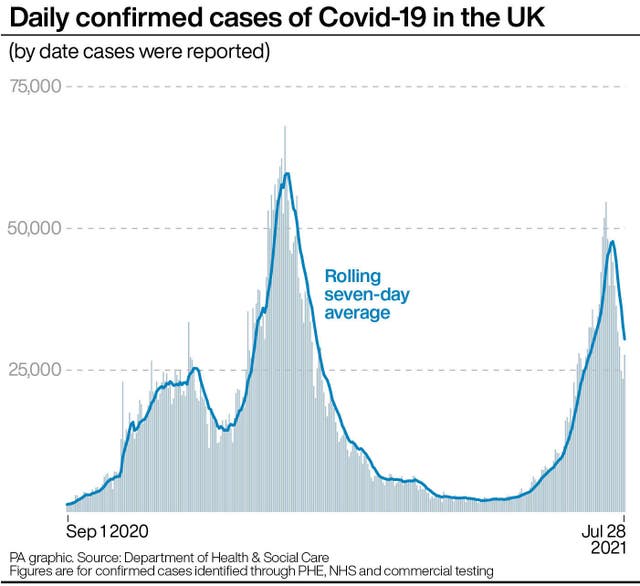Javid says ‘no-one really knows’ future Covid trajectory after rise in cases
Sajid Javid has previously warned there could be 100,000 daily cases over the summer.

Covid-19 cases in the UK have increased for the first time in a week, as the Health Secretary warned “no-one really knows” what will happen next with the numbers.
Sajid Javid followed Prime Minister Boris Johnson in adopting a cautious tone after official figures had shown the number of newly reported cases dropped for seven days in a row.
A senior minister also told the Daily Mail that Covid is “all over bar the shouting” after cases dropped sharply from above 50,000 on July 17 to below 24,000 on July 27.
But on Wednesday the Government confirmed that, as of 9am, there had been a further 27,734 lab-confirmed Covid-19 cases in the UK.

Speaking at a vaccination centre in London’s Little Venice, he told the PA news agency: “The truth is, when it comes to case numbers no-one really knows where they are going to go next.
“I hope that the falls that we’re seeing now are sustained. That’s of course what I want to see.
“But we’ve already seen with the Delta variant, a new variant that emerged over the last year, that’s more infectious than the previous one, that things can change.
“And so, I think it’s important to remain cautious, not get too optimistic.”
Mr Johnson earlier stressed the need for caution despite recent falls in case numbers as he warned that the virus “still presents a significant risk”.
Mike Tildesley, who sits on the scientific advisory body Scientific Pandemic Influenza Group on Modelling (SPI-M), said that it was not yet clear whether the third wave was turning around.
A recent fall in infections could be attributable to people being less willing to “step up” and get tested ahead of their summer holidays, Dr Tildesley, professor of infectious disease modelling at the University of Warwick, said.
Meanwhile testing among school pupils in England will have reduced since the end of term last week, he added.
Asked about the prospect of looking back on the pandemic in October, Mr Johnson told LBC Radio: “We’ve seen some encouraging recent data, there’s no question about that, but it is far, far too early to draw any general conclusions.”
He added: “The most important thing is for people to recognise that the current situation still calls for a lot of caution and for people just to remember that the virus is still out there, that a lot of people have got it, it still presents a significant risk.”
Meanwhile, Mr Johnson rejected Cabinet minister Michael Gove’s claim that people who refuse to get a vaccine are “selfish”, adding: “I would put it the other way round and say that if you get one you are doing something massively positive for yourself, for your family.”
Mr Johnson was challenged over his plan to require a vaccine certificate to visit nightclubs from the end of September.
“It’s a very positive thing to do to get a vaccine,” he said.
Meanwhile, he said that the number of 18 and 19-year-olds who had come forward to get the vaccine – almost 70% so far – was “stupendous”.
Asked whether it was certain that those fully vaccinated would be able to escape having to self-isolate from next month if they come into contact with a positive coronavirus case, the Conservative Party leader said: “August 16 is nailed on – there has never been any question of a review date for August 16.
“I’m very pleased that this is a country that now has the highest proportion of vaccinated adults of any country in the world – that is enabling us to make the economic progress we are.”
Dr Tildesley said that he hoped that some sort of normality could resume in the autumn.
Dr Tildesley added that Covid-19 “isn’t necessarily all over bar the shouting quite yet”.
He said: “It’s pretty clear that we are not back to kind of pre-pandemic levels of mixing – people aren’t socialising in the same way they were before the pandemic, hopefully that will come.
“But I think that’s probably partly what we’re seeing in the data – that we’re not seeing a big surge in infections because people are taking a little bit of time to get back to normality.”





